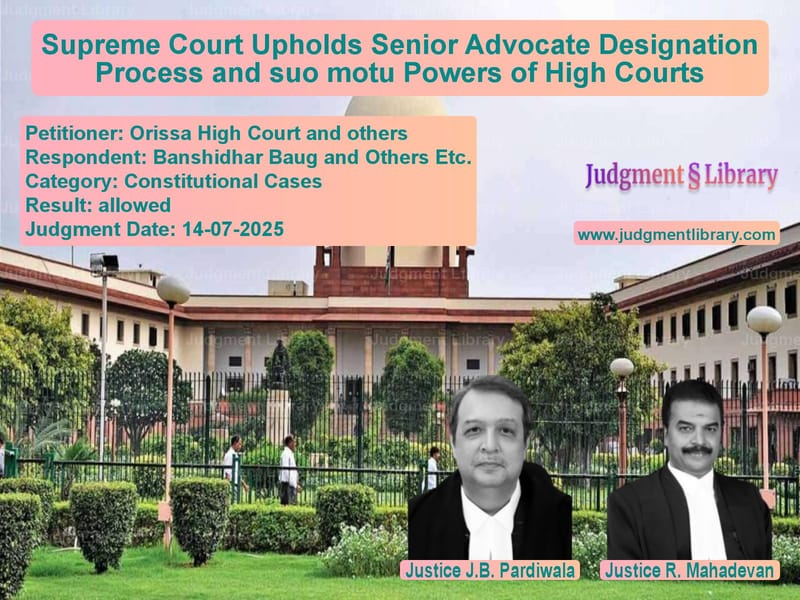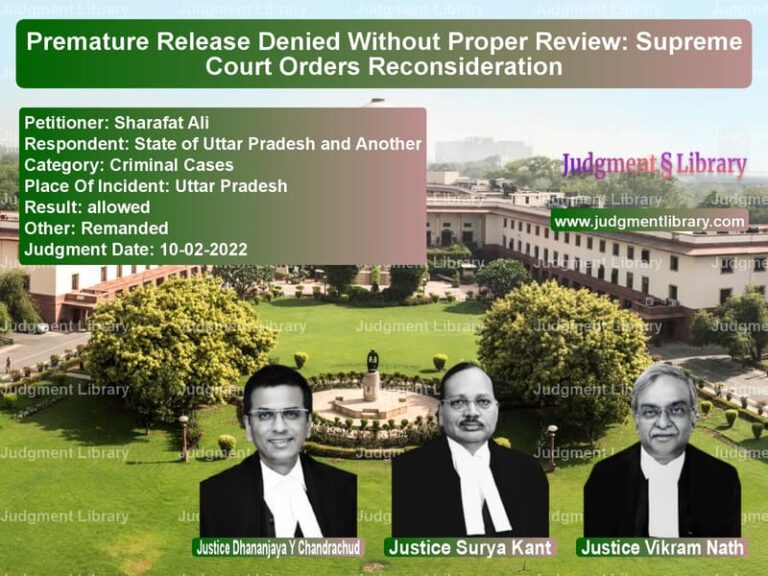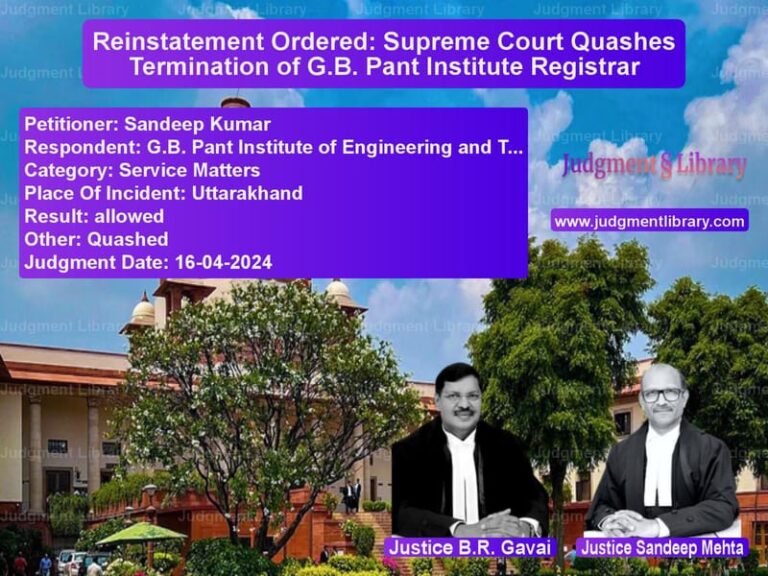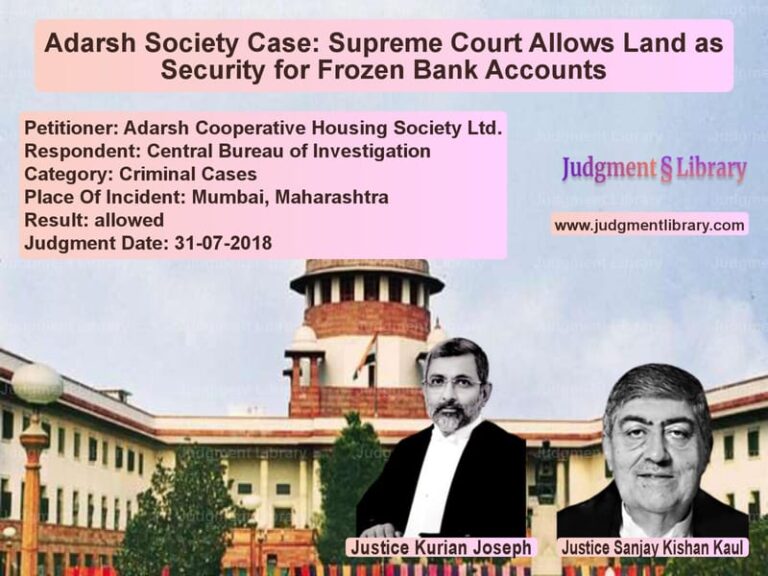Supreme Court Upholds Senior Advocate Designation Process and suo motu Powers of High Courts
In a landmark judgment that clarifies the intricate process of designating Senior Advocates in India, the Supreme Court delivered a comprehensive verdict on July 14, 2025, addressing the constitutional and statutory framework governing the recognition of legal excellence. The case, which originated from the Orissa High Court, represents a significant chapter in the ongoing evolution of transparency and fairness in the legal profession’s most prestigious honor.
The dispute centered around the High Court of Orissa’s (Designation of Senior Advocate) Rules, 2019, particularly Rule 6(9), which allowed the Full Court to designate advocates as Senior Advocates suo motu – meaning on its own motion, without requiring a formal application. This provision was challenged before the High Court’s judicial side, which declared it ultra vires and not in consonance with the Supreme Court’s guidelines laid down in the landmark Indira Jaising case.
The petitioners, representing the Orissa High Court on its administrative side, made several compelling arguments before the Supreme Court. They contended that “the Rules, 2019 as amended, contemplate the modes of designation i.e. (i) A written proposal proposing an Advocate by the Chief Justice/Judge or submission of written application by the Advocate concerned; and (ii) Suo motu designation by the Full Court, which amounts to a ‘recognition’ of eminence and excellence.” They further emphasized that “the guidelines/framework laid down in Indira Jaising -1 and clarified in Indira Jaising -2, apply only to the first mode – i.e., when designation is sought via application – not to the suo motu designations made by the Full Court.”
The petitioners strongly asserted that “the entire structure – such as the Secretariat, Permanent Committee, and the application-based process – was created by this Court in Indira Jaising -1. These mechanisms are in addition to, and not in derogation of the powers of the Full Court. It was emphasized that the plenary powers of the Full Court were not curtailed by this Court. Rather, a supplementary mechanism was created for candidates who voluntarily seek designation.” They further reinforced that “the source of power of the Full Court for designation of Senior Advocates flows directly from Section 16 of the Advocates Act, 1961. The mechanism created by Indira Jaising -1 is procedural and applies only to applicants. It cannot be construed to have taken away or diluted the inherent suo motu power of the Full Court to designate advocates.”
The respondents, however, presented contrasting viewpoints about the designation process. They argued that “this Court in several pronouncements, has held that the designation of advocates as Senior Advocates is a privilege or honor based on the knowledge and expertise contributed by the individual to the legal profession. However, the guidelines brought in by the Indira Jaising -1 and 2 judgments, on the ground of promoting transparency, have equated the process of designation to that of a promotion in a company.”
They expressed concerns that “the process of applying pursuant to an advertisement, undergoing consideration before the Permanent Committee, inviting views / suggestions from the Bar, and attending an interview dilutes the original process of senior designation, wherein, the High Courts had the suo motu power to designate an advocate based on their intellect, honor, courtroom presentation, and contribution to the legal fraternity. This new process, according to the learned counsel, undermines the very essence of the honorary position granted to a Senior Advocate under the Advocates Act, 1961.”
The respondents also highlighted practical difficulties, stating that “this process also creates an embarrassing and unwilling situation for advocates who have been in practice for over 40 years or have surpassed the age of 65. Such senior advocates may hesitate to go through the elaborate procedure, fearing low marks in parameters such as publications and interview performance, leading to embarrassment in front of their peers.”
The Supreme Court, in its analysis, began by examining the statutory foundation of Senior Advocate designation. The Court noted that “The source of the power to designate an advocate as Senior Advocate is contained in Section 16(2) of the Advocates Act, 1961, which reads as under: ’16. Senior and other advocates: …… (2) An advocate may, with his consent, be designated as senior advocate if the Supreme Court or a High Court is of opinion that by virtue of his ability standing at the Bar or special knowledge or experience in law he is deserving of such distinction.’ Thus, the above provision implicitly recognizes the power of a High Court to confer the distinction of Senior Advocate, subject to its opinion that the concerned Advocate, by virtue of his ability, standing at the Bar, or special knowledge or experience in law, is deserving of such recognition.”
The Court traced the evolution of the designation process through the Indira Jaising cases, noting that while the Supreme Court had established guidelines for transparency, it had explicitly preserved the suo motu power of courts. The judgment referenced “the clarification issued by this Court in Indira Jaising -2. The relevant paragraphs of the said judgment are extracted below: ‘9. Vide an elaborate judgment dated 12.10.2017, a three-Judge Bench of this Court laid down a series of guidelines to bring in greater transparency and objectivity in the designation process. This was done while retaining the suo motu designation power of the Court. These guidelines have been set forth in para 73 of the judgment.’ ’48. Here, we would like to reiterate the observation made in the 2017 Judgment [Indira Jaising v. Supreme Court of India, (2017) 9 SCC 766 : (2017) 4 SCC (Civ) 575 : (2017) 2 SCC (L&S) 802, (hereinafter ‘the 2017 Judgment’)] that the power of suo motu designation by the Full Court is not something that is being taken away. This power has been and can continue to be exercised in the case of exceptional and eminent advocates through a consensus by the Full Court.'”
The Supreme Court also considered the recent judgment in Jitender @ Kalla v. State of NCT of Delhi, which had undertaken a comprehensive reconsideration of the designation process. The Court noted that “Upon thorough reconsideration of the above judgments, including Jitender @ Kalla, the Court observed that Section 16(2) of the Advocates Act, 1961 was amended in 1973 (effective from 31.01.1974), replacing the phrase ‘experience and standing at the Bar’ with ‘ability, standing at the Bar, or special knowledge or experience in law’. The Court emphasized that the standards for the designation of Senior Advocates must be significantly higher than those applicable to other advocates. Ultimately, the Court reaffirmed the validity of suo motu designations by Full Court, provided such designations adhere to the constitutional principles of fairness, transparency, and objectivity.”
The Jitender @ Kalla judgment had provided crucial guidance, stating that “On plain reading of Sub-section (2) of Section 16, the Legislature never contemplated an Advocate making an application seeking designation. The scheme of Sub-section (2) of Section 16 indicates that designation has to be conferred by the Supreme Court or the High Courts. The scheme of Sub-section (2) of Section 16 indicates that an individual Judge of the Supreme Court or the High Court, as the case may be, cannot recommend any Advocate for designation as the decision is a collective decision of the Full Court. Even if an Advocate deserving of a designation does not apply for designation, on the basis of the discussion in the house, the Full Court can always recommend his/her designation, subject to his/her consent. For that purpose, the recommendation in writing of an individual Judge is not warranted.”
The Supreme Court, in its final analysis, emphasized the fundamental nature of Senior Advocate designation, stating that “Before parting, we wish to observe that the designation of a Senior Advocate is a mark of distinction granted by the Court in recognition of exceptional legal acumen and advocacy. It is not conferred as a matter of right, nor can any advocate claim it merely on the basis of seniority, experience, or popularity. The designation is conferred at the discretion of the Court, upon satisfaction that the advocate possesses outstanding ability, integrity, and professional standing. Courts are not expected to grant this status arbitrarily or as a matter of favour. At the same time, the process for designation must be merit-based, transparent, fair, and free from personal preferences or informal influences. It must, therefore, be reiterated that the conferment of Senior Advocate status is a privilege, not an entitlement, and must be governed strictly by the principles of fairness, accountability, and institutional integrity.”
In its concluding remarks, the Supreme Court set aside the High Court’s order and upheld the validity of the suo motu designation power. The Court directed that “the amended Rule 6(9) shall remain in force until fresh rules are framed by the High Court” in accordance with the principles laid down in the Jitender @ Kalla judgment.
This judgment represents a significant balancing act between maintaining the traditional honor-based nature of Senior Advocate designation while ensuring that the process remains transparent, fair, and objective. It reaffirms the constitutional authority of High Courts while providing necessary safeguards against arbitrariness. The decision acknowledges that while the legal profession must evolve with changing times, the fundamental recognition of legal excellence must remain a judicial prerogative exercised with wisdom and discretion.
The Supreme Court’s ruling ensures that the designation of Senior Advocates continues to represent the highest standard of legal professionalism while adapting to contemporary expectations of transparency and fairness in judicial processes. It strikes a careful balance between preserving the dignity of the honor and ensuring that the process of conferment remains beyond reproach, thus strengthening public confidence in the legal system.
Petitioner Name: Orissa High Court and others.Respondent Name: Banshidhar Baug and Others Etc..Judgment By: Justice J.B. Pardiwala, Justice R. Mahadevan.Judgment Date: 14-07-2025.Result: allowed.
Don’t miss out on the full details! Download the complete judgment in PDF format below and gain valuable insights instantly!
Download Judgment: orissa-high-court-an-vs-banshidhar-baug-and-supreme-court-of-india-judgment-dated-14-07-2025.pdf
Directly Download Judgment: Directly download this Judgment
See all petitions in Fundamental Rights
See all petitions in Constitution Interpretation
See all petitions in Separation of Powers
See all petitions in Public Interest Litigation
See all petitions in Legal Malpractice
See all petitions in Judgment by J.B. Pardiwala
See all petitions in Judgment by R. Mahadevan
See all petitions in allowed
See all petitions in supreme court of India judgments July 2025
See all petitions in 2025 judgments
See all posts in Constitutional Cases Category
See all allowed petitions in Constitutional Cases Category
See all Dismissed petitions in Constitutional Cases Category
See all partially allowed petitions in Constitutional Cases Category







